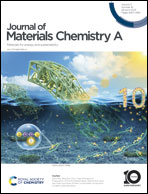Accelerated discovery of cost-effective Nd–Fe–B magnets through adaptive learning†
Abstract
Designing Nd–Fe–B-based permanent magnets with exceptional high temperature stability is a critical step for extending their use in traction motors with an operating temperature of ∼150 °C. Conventionally, the high temperature stability is achieved through doping heavy rare-earth elements such as Dy, Tb, etc., which leads to elevated cost in the meantime. Efforts towards doping Nd–Fe–B with lower-cost elements such as La, Ce, and Y, and leveraging the temperature stability with Co and Ni to retain high-temperature performance (remanence and coercivity) have been underway for many years. A critical challenge, however, is the cost in time and resource required for optimizing the doping concentration of these species on a trial-and-error basis. In this work, we demonstrate the utilization of the ‘adaptive’ learning framework (based on Bayesian Optimization) in the composition optimization of Nd–Fe–B-based magnets: (Nd80Pr20)30.80−x−y−zLaxCeyYzFe66.67−u−wCouNiwB0.96M1.57 (M = Al, Cu, Ga, Ti, in wt%) towards an improved performance–cost ratio. Starting from a limited set of 24 compositions, 9 novel compositions were recommended within 3 iterations, which were then experimentally fabricated, with their magnetic properties measured. The best two candidates identified in the last iteration showed 18.4% and 13.1% improvement in the performance–cost ratio with respect to the benchmark Nd–Fe–B, respectively. The adaptive learning framework proved efficient in screening novel compositions and guiding the experimental design of Nd–Fe–B-based permanent magnets in this work, suggesting great promise for its adoption for other multi-component systems targeting an improved performance–cost ratio.



 Please wait while we load your content...
Please wait while we load your content...